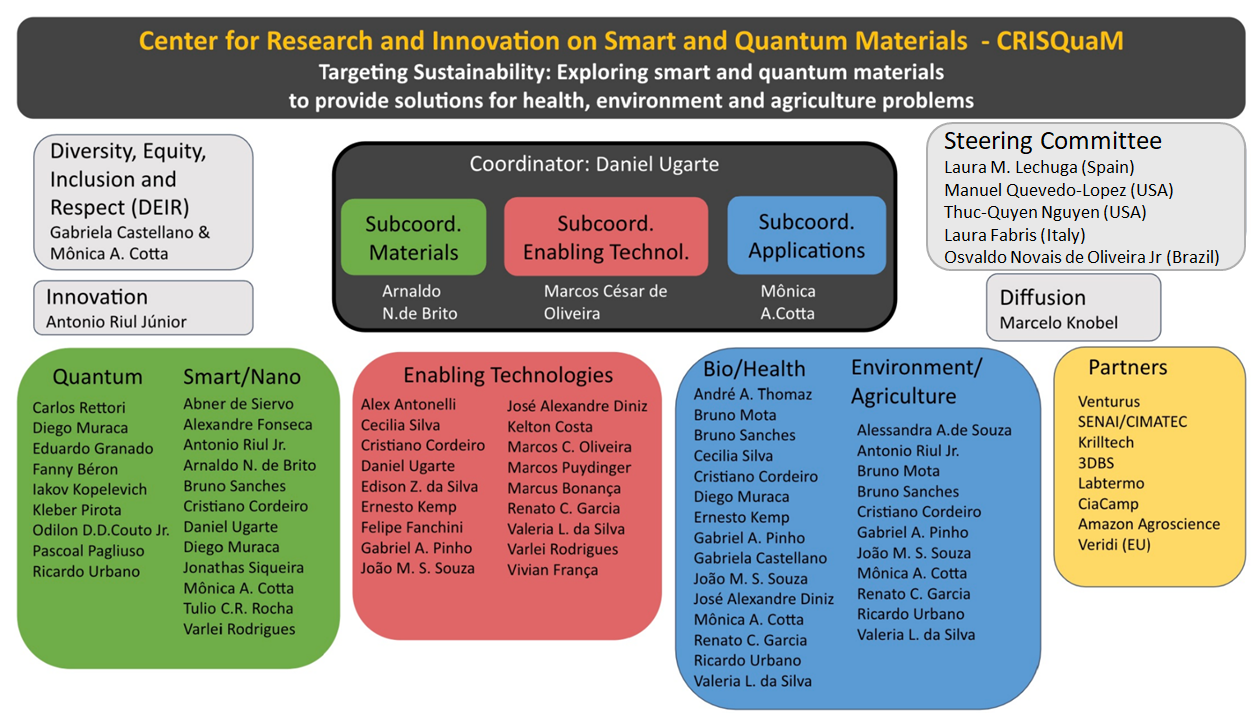BV-FAPESP: research projects supported in this Center
CRISQuaM in the Media: news about the center
CRISQuaM aims to explore the synergistic development of fundamental and applied science to create new materials with high potential for the construction of devices and sensors to address technological challenges related to sustainability, climate change, precision agriculture, ecology, and health. To achieve these goals, we have assembled an interdisciplinary and collaborative research team, integrating expertise across various scientific domains, researching novel materials with high innovation potential. By combining original synthesis methods, advanced characterization techniques, theoretical approaches, computational simulations, quantum technologies, and device construction designs, we aim to drive advances in smart and quantum materials, promoting scientific excellence and technological development. With this, we plan disruptive innovations in instrumentation—including hardware and AI-based tools—as well as in quantum technologies, biomedical devices, and signal processing, in addition to plant bionics, exploring plant-pathogen interactions. Besides research activities, we plan intensive actions in education, dissemination, and communication for the general public, as a modern society should be aware of the challenges humanity faces and how research and technology are essential for responsibly utilizing the planet's limited resources. CRISQuaM's Innovation activities are accelerated through partnerships with several companies in related technologies, many of them Brazilian. Finally, all activities of the Center are managed in accordance with diversity, equity, and inclusion goals and best practices.
The Center brings together scientists, engineers, and innovators in a collaborative effort to apply materials science and quantum technologies at the cutting edge, designing new materials and nano(bio)sensors for advanced diagnostics. The Center has a team capable of producing a wide range of (nano/micro) materials, along with precise chemical and physical characterizations using modern techniques (synchrotron, advanced microscopy, magnetotransport, magnetic resonance, optics, etc.). In addition, the team offers various options in enabling technologies, including miniaturization, processing, and additive manufacturing, as well as instrumentation, quantum sensing, and electronics development. Data analysis will employ updated approaches (numerical simulation, classical and quantum machine learning, and quantum optimization). Applications at the knowledge frontier will address urgent sustainability needs in environmental areas, precision agriculture, plant bionics, and biomedical interfaces, contributing to the development of local technologies in close partnership with the Brazilian industry.
The organization of the Center is based on three pillars — Materials, Enabling Technologies, and Applications — together with partner companies, as described in the figure below.

2023-08-16
A study published in Nature and led by scientists at Brazil’s National Space Research Institute (INPE) and Bristol University in the UK describes a novel methodology for calculating the carbon absorption capacity of recovering areas in the Amazon, Congo and Borneo, which contain the world’s largest tropical rainforests. Together these areas remove at least 107 million metric tons from the atmosphere every year.
2023-08-09
Photodynamic therapy developed by the Center for Research in Optics and Photonics, which is supported by FAPESP, has been recommended by Brazil’s federal body responsible for including novel healthcare technologies in the national health service.
2023-08-09
A study combining genetic analysis and oceanographic simulations showed that a species of mangrove rarely disperses very far, so that North and South Brazil have two distinct populations. The results can help prioritize conservation units and understand global patterns in mangrove forest formation.
2023-08-09
Researchers at the University of São Paulo analyzed inflammatory markers in cyclists who trained regularly and had been exposed to traffic-related pollution. The results of the experiment, which was conducted in São Paulo city, are published in the American Journal of Physiology.
2023-08-09
Genome sequencing of clinical samples from a child hospitalized in Aracaju, the capital of Sergipe state (Brazil), revealed the simultaneous presence of the protozoan Leishmania infantum and an as-yet unnamed parasite belonging to the genus Crithidia, identified earlier in a fatal case of visceral leishmaniasis in the same region.
2023-08-09
The aim of the study is to understand the strategies used by children and young people in low-income households to adapt to the public health crisis and economic hardship in the UK, South Africa and Brazil.
2023-08-02
One of the goals of the study conducted by scientists at the Center for Development of Functional Materials and the Center for Innovation on New Energies is to reduce atmospheric emissions of this greenhouse gas.
2023-08-02
An investigation covering four different parts of Brazil carried out analysis of genomic data from 34 fossils, including larger skeletons and the famous mounds of shells and fishbones built on the coast, and revealed differences between communities. An article on the study is published in Nature Ecology & Evolution.